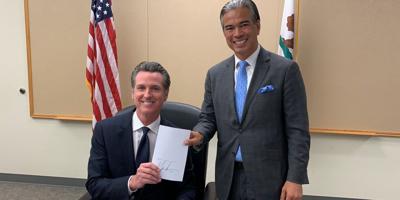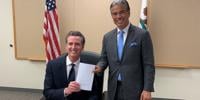
From left, California Gavin Newsom and California Attorney General Rob Bonta
SAN FRANCISCO - A federal judge has ruled that President Donald Trump cannot use the National Guard or U.S. Marines to protect federal agents from rioters seeking to use violence and other intimidation tactics to block or prevent federal agents from enforcing federal immigration law in California.
In the ruling, U.S. District Judge Charles Breyer specifically noted that all federal agents should be free to carry out their lawful duties in safety.
But should rioters or other activists amass to assault them or violently prevent them from carrying out those duties, the judge essentially ruled the federal agents must rely on local civilian law enforcement for help - even if state law, such as is is the case in California, explicitly prohibits local and state police from assisting them, until public opposition to the federal enforcement actions becomes an unlawful and violent riot.
In the ruling issued Sept. 2, the judge sided entirely with California Democrats in their dispute with the Trump administration over the president's decision to order a military task force to provide security and support for Immigration and Customs Enforcement (ICE) agents while conducting immigration enforcement operations in California earlier this year.
Trump had ordered 4,000 California National Guardsmen and 700 U.S. Marines to assist federal agents and help secure federal property in the face of riots that arose in response to efforts by ICE to enforce federal immigration law and detain and deport illegal immigrants in California.
In that order, Trump had cited federal law which he said allows the president to activate federal troops and "federalize" state National Guard troops under federal orders in response to an invasion, rebellion or violent resistance to efforts by federal agents to carry out duties under federal law.
The law has been used in the past by President Lyndon B. Johnson to compel desegregation in Arkansas public schools and by President Richard Nixon to deliver mail when U.S. Postal Service workers went on strike.
In California, ICE agents conducting enforcement actions were met by rioters who blocked traffic, threatened officers and bystanders, lit vehicles on fire, looted stores, attempted to attack federal facilities in L.A., and attacked agents with commercial grade firecrackers, large rocks, chunks of concrete and even motorized scooters, which were hurled at agents from off highway overpasses.
Similar tactics were used against L.A. police officers and other local law enforcement who responded to the riots and attempted to restore order.
Despite the violence and riots, California Gov. Gavin Newsom and Attorney General Rob Bonta - both of whom have declared their intent to resist federal immigration enforcement actions under Trump - argued in court that the local law enforcement response was sufficient to protect the ICE agents and allow immigration enforcement to safely continue.
They asserted the violence was the fault of Trump for ordering the immigration operations in the first place and the following federal military response, not the rioters - who Newsom, Bonta and other Democratic officials have called "protestors."
They asserted the military deployment in support of ICE was unlawful under federal law. Newsom argued the president must first secure his permission before ordering in National Guardsmen to respond to unrest.
Judge Breyer initially agreed with them, and blocked the deployment.
On appeal, however, a three-judge panel of the U.S. Ninth Circuit Court of Appeals tossed out that ruling, saying they believed Congress, under federal law, has given the president the ultimate power to "call forth the Militia" and the president did not clearly overstep the law by activating the troops in L.A. to protect ICE and federal property from riots and attacks.
However, in the appellate ruling, the judges also emphasized that "the ruling did not address other questions, including 'the nature of the activities in which the federalized National Guard may engage,' under the 1878 federal law, known as the Posse Comitatus Act, which generally forbids the use of federal soldiers to carry out law enforcement actions in the U.S.
Immediately following the ruling, Newsom and Bonta seized on that reasoning, asserting the federal military deployment in L.A. violated the Posse Comitatus law.
Breyer fully agreed that he believed the deployment amounted to illegal use of soldiers in domestic law enforcement.
In the ruling, Breyer noted his decision comes as Trump has indicated his intent to again use active duty soldiers and the National Guard to support federal law enforcement actions in other crime-plagued cities across the U.S., including San Francisco and Oakland in the Northern District of California.
Trump has also particularly indicated his desire to use the National Guard to help fight crime in the city of Chicago, as well, also drawing sharp responses and pledges of resistance from that city's mayor, Brandon Johnson, and Illinois Gov. JB Pritzker, also Democrats.
In the ruling, Breyer noted that the Posse Comitatus Act was enacted in the late 19th Century at the urging of white southerners who had grown increasingly angry at the federal use of soldiers to enforce equal rights for black citizens amid Reconstruction following the Civil War.
But the judge said the law still applies, and can be used by the state of California and likely other local jurisdictions to oppose federal military deployments on U.S. soil in support of federal law enforcement actions, even if local law enforcement is forbidden by state law from supporting those federal actions and even if those federal actions draw violent responses from rioters and activists opposed to the federal law enforcement.
Breyer said the organization of a federal military task force to provide security and traffic and crowd control for federal immigration enforcement actions and other federal law enforcement activities amounted to illegal military law enforcement activities.
In the ruling, Breyer asserted the federal government fell short of proving that California and Los Angeles police weren't up to the task of protecting ICE agents in the field. The judge agreed that the anti-ICE riots were large and violent, contrary to the claims of Newsom and Bonta that the riots were “isolated instances” stoked by federal actions.
But the judge said he agreed with Newsom and Bonta that L.A. police are well-equipped to respond to riots, meaning federal agents who find themselves targeted by rioters must wait for local police to agree to help them.
The judge's decision did not address California state law that prohibits police from assisting ICE in carrying out immigration enforcement, even if ICE provides local police with notice of their planned enforcement actions.
Rather, the judge said California was correct that the "context" of the deployment was sufficient to deny the president the authority to use military troops to fill in security gaps left by state and local officials' refusal to support and, in some cases, outright resistance to federal immigration enforcement efforts.
While past presidents have used the authority under federal law to call in the Guard, Breyer said Trump's immigration enforcement operations don't enjoy the same legal protections. To find otherwise would grant this and future presidents a "perpetual, atextual right to defy Congress if he determines it necessary to protect federal property, personnel, or functions," Breyer wrote.
"Such an exception would be limitless in principle," Breyer said. "It would allow the President to deploy troops to accompany any federal employee whose job puts them at some risk - as do the jobs of many federal employees, from OSHA inspectors to IRS agents to U.S. marshals. There is no question that federal personnel should be able to perform their jobs without fearing for their safety.
"But to use this as a hook to send military troops alongside federal agents wherever they go proves too much and would frustrate the very purpose of the Posse Comitatus Act," the judge said.
The judge placed his order on hold until Sept. 12, giving the Trump administration time to bring their expected appeal back to the Ninth Circuit.


